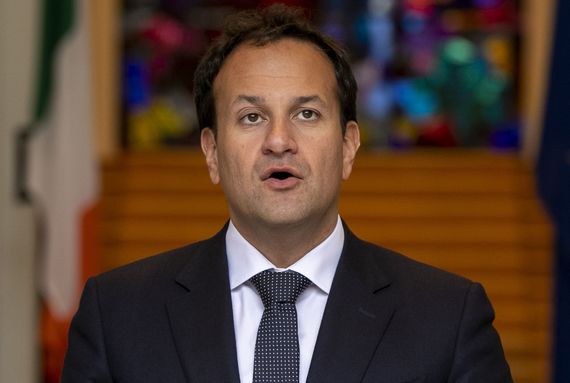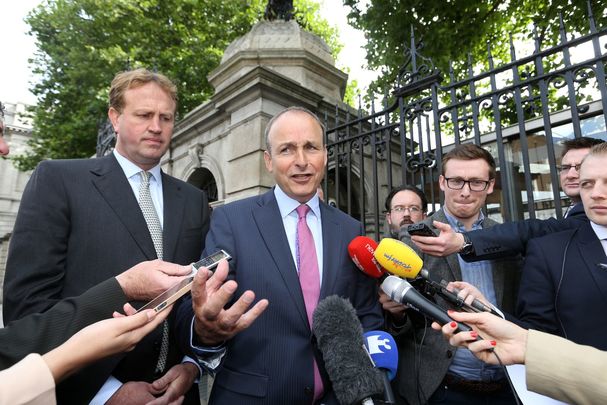It's taken 100 years, but at last, the two sides in the Civil War have come together in an administration. The century-old divide caused by the refusal of the side that would become Fianna Fail to accept the Treaty and the separation of Northern Ireland has been bridged.
In recent decades, of course, there has been little difference between them. Fianna Fail claims to be the true republican party and to represent ordinary workers as well as all levels of Irish society. Fine Gael is seen as the party of law and order, the strong farmer, and big business.
But the reality is they are both parties of the center with little to separate them in policy these days on the economy, social issues, even on the North.
Read more: Coronavirus live updates from Ireland
For that reason, the old enemies coming together to form a government have not attracted as much interest as might be expected. Much of the comment in the past few days has instead been about the Green Party and the emphasis on climate action in the program for the new government.
But this is a historic milestone in Irish politics and it is worth recognizing that and celebrating it. And it comes with accidental but appropriate timing, exactly a century after the War of Independence and the foundation of the Irish Free State.
It's a mistake to underplay the significance of this. There are still diehards in both parties, particularly in Fianna Fail where a sizable number of its members in local councils around the country opposed the deal, who still find it hard to move on from the past and what it represents.
For them, this is a historic moment, as it is for the country at large. It's a step that is long overdue, but it's welcome now nonetheless.
The deal involves Fianna Fail leader Micheal Martin and Fine Gael leader Leo Varadkar sharing the position of taoiseach during the five-year term of the government. Martin is taoiseach for the first two and a half years, an extraordinary achievement for him which is being referred to as the biggest comeback since Lazarus. Both he and Fianna Fail were dead and buried by the financial crash and his quiet, patient rebuilding of the party over the past 10 years has now paid off.

Leader of the Fine Gael party, Leo Varadkar.
Martin is quite different to Varadkar. His style is polite and conciliatory, almost to the point of diffidence. Varadkar is combative and outspoken, always telling it like it is, or so he claims.
Varadkar's father (like de Valera's) is not Irish. He’s a successful Indian doctor who gave his son a comfortable upper-class upbringing in Dublin.
Read more: Ireland's new Taoiseach speaks with UK Prime Minister and heads of EU
Martin's father was a bus driver and he grew up in a working-class area in Cork in a small house where his sister still lives. One of his grandfathers was in the Old IRA and the other was in the British Army during the First World War. He embodies the complexity of Irish history.
Both Fianna Fail and Fine Gael will do their best to maintain their separate identities in the months and years ahead. That is to be expected but working together in government inevitably will bring them even closer, particularly given the enormous problems this new administration faces.
This is a historic government but it is facing challenges of historic proportions. No other government here has ever had to confront anything like it.
First, there is the ongoing COVID situation, both at home and abroad. At home, we have done remarkably well in containing the virus, but the situation abroad remains very uncertain which is not good for our exporting economy.
Our important tourism sector has been decimated. How fast and how much we should open up to foreign travel is still in question, with fears that it could spark a second wave here.
The cost of our shutdown has been enormous and it has yet to hit most people because of government supports. Over a million people here, almost half the entire workforce, are either on the very generous pandemic unemployment payment or if they still have jobs, their pay is being supported by the wage subsidy scheme even though many are not doing much. It's like an extended holiday and reality has yet to kick in.
This is the first problem the new government will face. The situation cannot continue indefinitely. The pandemic payments and other supports are due to be wound down from the end of August, and as they are tapered off there will be a strong backlash against the new government which will be ruthlessly exploited by Sinn Fein and the rest of the opposition.
Eamonn Ryan, Leo Varadkar and Micheal Martin, at Dublin Castle.
Whether the planned stimulus package to be announced in a few weeks will be enough to carry the country forward is doubtful. Unemployment is likely to remain at a very high level. A second national wave or even localized upticks in the virus could make a difficult situation far worse.
Also coming down the tracks is Brexit. Even if some kind of trade deal is cobbled together by the EU before the end of the year to avoid a U.K. crash out, the outcome is not going to be good for Ireland and could be catastrophic in some sectors like food exports. With our deficit now soaring that will make our financial situation even less sustainable.
The intention is to borrow heavily, making use of current low-interest rates, to ease the impact on the public. But that can only continue for so long, and with our national debt already very high it puts us in a precarious position when rates start to climb again. And at some point, they will.
Both Martin and Varadkar have said there will be no return to austerity, which is now a dirty word in Irish politics. But whatever language is used, the reality facing this government is likely to be an increasing need to control spending and/or raise taxes as time goes on.
The only thing that will change that reality is the emergence of a vaccine or effective treatment and a return to some kind of global normality. Even then there is likely to be a lag and a residual mountain of debt here which will severely limit what this new government can do in the next five years.
All of this is the backdrop to the extravagant promises made pre-COVID during the election campaign and now contained in the program for this new government. As well as rebuilding the economy at a cost of many billions, this includes massive house building, the reform of the health service, huge spending on infrastructure and public transport, better education and childcare services, and much, much more. And that's before we add in the enormous cost of reducing our greenhouse gas emissions by an annual seven percent, which is the Green Party's core requirement for this government.
Despite the proud smiles from the new ministers last weekend, this will be a terrible time to be in government. Disappointment and hard times lie ahead for the voters, even if they don't yet know it. Difficult decisions and endless hours of hard work lie ahead for the politicians, who will get little thanks for their efforts.
Meanwhile, Sinn Fein will be chanting their meaningless "change" mantra from the opposition side, criticizing everything but offering no solutions that are economically viable (unless you're a fan of the Chinese model).
Faced with this impossible situation, it's interesting that the two most challenging departments, health, and housing, have been allotted to two Fianna Fail first-time ministers. Whether that is a result of Fine Gael cleverness or Fianna Fail hubris remains to be seen. But it's not going to be easy for the new ministers, Stephen Donnelly (health) and Darragh O'Brien (housing).
Health is a bureaucratic monolith that costs the state a fortune yet fails to deliver to the standard of the better European countries. Fixing it has defeated all the recent ministers for health, including two who (like Varadkar) were doctors.
It was the new Taoiseach Martin who, as minister for health back in 2004, set up the monolithic national Health Service Executive to replace the local health boards which had been corrupted by local politicians bumping their voters up the waiting lists for hip replacements, etc. Maybe Martin has new ideas on what to do now, but Donnelly will be up against it.
On housing, the situation is that we were on track to complete over 20,000 new homes this year (a number far below what is needed) but thanks to the virus that will now be 14,000 at the very best and could be a lot worse. The housing crisis is not going to be fixed any time soon, no matter how much effort O'Brien puts into trying to make social and affordable housing available by using state land and offering incentives to the sector to build more homes. We're still playing catch-up after the property crash and will be for a few years more at least.
All told it's a nightmare time to be in government here, historic or not.
Read more: Former Irish president calls Catholic Church views on LGBTQs “intrinsically evil”




Comments